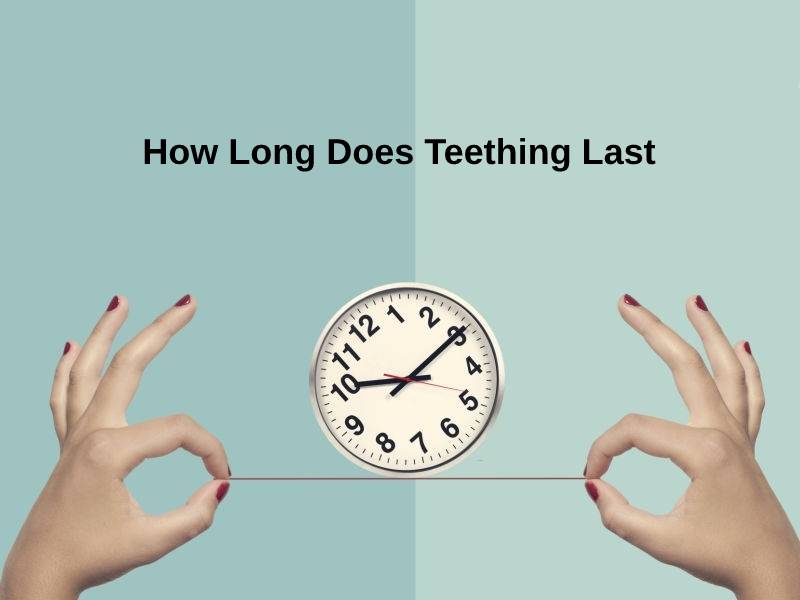Exact Answer: 2 to 3 years
Teething or odontiasis can be simply defined as the process in which infant babies grow their first set of teeth. It can be a milestone for most parents to see their children grow their first few teeth within a few months of their birth. It is a painful process that may take up to 3 years to complete.
The process may start as early as 3 months or can take more time depending on the health and growth of each baby. It starts when the baby is 4 to 7 months old. The tooth erupts through the baby’s gum and grows, making it an uncomfortable period for both the baby and the parent. The teething process may be accompanied by other symptoms such as irritability and gnawing.
Some babies may have a painless teething period, whereas some may face disruption in eating and sleeping patterns. One can consult a doctor to make this period much easier for infants. Babies can be given something to chew on to take the pressure of a tooth coming out of the gum tolerable.

How Long Does Teething Last?
The teething of a baby begins at the age of four to seven months and may take up to 2 to 3 years for a set of 20 teeth to grow. The phase of teething or tooth eruption starts with the growth of lower central incisors and the rest of the set appear in the following manner:
- lower central incisors
- upper central incisors
- upper lateral incisors
- lower lateral incisors
- upper first molars
- lower first molars
- upper canines
- lower canines
- lower second molars
- upper second molars
With no underlying health issues, a baby shall grow a new tooth every 2 to 4 months, and the process normally continues till the baby is 2 years old. The lower second molar and upper molar are the last to grow during teething. The lower second molar grows between 23 to 31 months and the upper molar arrives between 25 to 33 months.
The first back teeth or molars appear between 12 – 14 months and they are the largest to erupt, causing the most discomfort. Molars are then followed by the four canine teeth that appear around 18 months. By the age of three, a complete set of 20 primary teeth shall grow.
The growing of the first few teeth can be extremely uncomfortable and painful for the baby, however, the pain decreases as more teeth begin to appear. The final pair of molars can bring back the pain again, but the pain subsides after the primary set of teeth has grown.
In summary:
| Type | Time |
| Lower Central Incisor | 4 – 7 months |
| Molars | 12 – 14 months |
| Canine | 16 – 18 months |
| Lower Second Molar | 23 – 31 months |
| Upper Molar | 25 – 33 months |
Why Does Teething Last So Long?
The time frame for teething may differ from kid to kid, depending on several factors. The presence of underlying health issues may delay the entire process. The age range is a general guide, and should not be followed blindly as some children may also show early tooth eruption.
Some infants may also experience teething at a later stage until they turn 15 months old because of hereditary reasons. Many symptoms such as excessive drooling, chewing, swollen gums, red cheeks, disturbed sleep, etc are also accompanied by the eruption of new teeth set. One can consult a doctor or use homemade remedies to reduce the associated painful symptoms.
Some useful remedies to treat teething and sore gums may include:
- Teething toys
- Using a cold washed cloth
- Gum massage
- Medicine
Conclusion
Teething is an uncomfortable process that each infant experiences at its own pace. It takes up to 2 to 3 years for a set of 20 primary teeth to appear. The process starts when the infant is 4 to 7 months old, however, some babies may experience delayed teething because of hereditary or underlying health issues.
Many symptoms are associate with the entire process of growing new teeth, which may cause food and sleep withdrawal, irritation, gnawing, sore gums, etc in babies. There are several home remedies such as using a cold washcloth for gnawing to reduce pressure and soreness, medication, or teething toys that one can apply to minimize discomfort and pain.